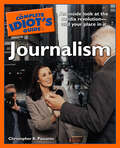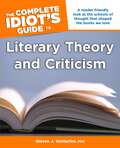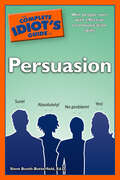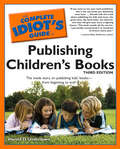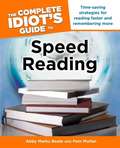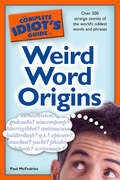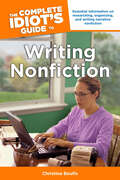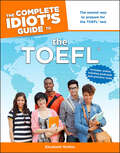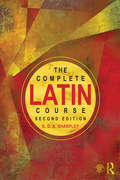- Table View
- List View
The Complete Idiot's Guide to Critical Reading
by Amy Wall Regina WallThe essential guide to looking at literature with your own two eyes. What students know about Shakespeare, Orwell, Dickens, and Twain is primarily what their instructors tell them. Here&’s a book that teaches the students how to move on to the next level—evaluate and read critically on their own, trust their own opinions, develop original ideas, analyze characters, and find a deeper appreciation for fiction, nonfiction, poetry, and more. • Ideal companion for college students and accessible for the casual reader as well. • Covers fiction, poetry, narrative nonfiction, biographies and memoirs, essays and editorials, and newspapers, magazines, and journals. • Features examples from published writing. • Includes a reading list and a glossary of literary terms.
The Complete Idiot's Guide to Grammar And Style
by Laurie E. RozakisYou're no idiot, of course. You've probably written your share of book reports,, term papers, e-mails, and thank you notes. The rules of writing can be confusing, however, and might result in final drafts riddled with gaffes, typos, and errors! The Complete Idiot's Guide® to Grammar and Style, Second Edition, will take you step by step through the basics of spelling, punctuation, and sentence formation to help you become an effective communicator of the written word! In this revised and updated Complete Idiot's Guide®, you get: Explanations of writing styles including exposition, narration, argumentation, and description. Definitions of such writing mistakes as dangling modifiers, mixed metaphors, and split infinitives–and how to avoid them. Examples of model documents such as resumes, cover letters, and thank you notes. The differences between drafting a business letter and crafting a personal one.
The Complete Idiot's Guide to Grant Writing, 3rd Edition
by Waddy ThompsonAn updated and revised edition-offering new information on some of the most popular topics in grant writing. This new edition of The Complete Idiot's Guide(r) to Grant Writing provides essential information on how to start a freelance business, covering such topics as getting that first assignment, pricing, state regulations, organizing and customizing proposals, researching funders, sponsorship, and much more. In the current economic environment, government and private sector grants will continue to be an important way to acquire funds for projects. Includes grant writing samples. This book's templates and other resources will now be easy to find and use on idiotsguides.com.
The Complete Idiot's Guide to Independent Filmmaking
by Josef SteiffYou ought to be making pictures. Designed for people who want to tell a story their way, The Complete Idiot&’s Guide® to Independent Filmmaking explains everything a budding auteur needs to know—from literary development and financial and organizational pre-production to principal photography production, post-production assembly, exhibition and distribution, and more. • The advent of desktop editing and a wide range of consumer cameras enable the average person to create a &“film studio&” at home. • A great &“textbook&” for novice filmmakers, whether film students or on-their-own auteurs. • The proliferation of film festivals around the world, many of which encourage submissions from &“amateur&” filmmakers, shows there are countless filmmakers who aren&’t learning the ropes in school. • Author has terrific credentials and has a feature-length script in development in Hollywood.
The Complete Idiot's Guide to Journalism: An Insider Look at the Media Revolution—and Your Place in It
by Christopher K. PassanteBreaking news! This is like having J-school in a book. In recent years, news reporting has dramatically changed. While the basic &“who, what, when, where, and why&” of journalism is still relevant, aspiring journalists are now asking &“how?&” The 21st century of blogs, instant internet access, and 24-hour news shows with minute–by–minute updates has made reporting a whole new—and very competitive—business. Here, a newspaper veteran answers every question about the new world of journalism, and explores every possibility for success.• Covers TV, radio, magazine, newspaper, e-zine, podcast, and internet reporting• Includes a resource list of media outlets, schools, and university programs• Explores different angles for approaching hard news, entertainment, weather, or sports
The Complete Idiot's Guide to Literary Theory and Criticism
by Steven J. VenturinoFrom Plato to Freud to ecocriticism, the book illustrates dozens of stimulating-and sometimes notoriously complex-perspectives for approaching literature and film. The book offers authoritative, clear, and easy-to-follow explanations of theories that range from established classics to the controversies of current theory. Each chapter offers a conversational, step-by-step explanation of a single theory, critic, or issue, accompanied by concrete examples for applying the concepts and engaging suggestions for related literary readings. Following a section on the foundations of literary theory, the book is organized thematically, with an eye to the best way to develop a real, working understanding of the various theories. Cross-references are particularly important, since it's through the interaction of examples that readers most effectively advance from basic topics and arguments to some of the more specialized and complicated issues. Each chapter is designed to tell a complete story, yet also to reach out to other chapters for development and debate. Literary theorists are hardly unified in their views, and this book reflects the various traditions, agreements, influences, and squabbles that are a part of the field. Special features include hundreds of references to and quotations from novels, stories, plays, poems, movies, and other media. Online resources could also include video and music clips, as well as high-quality examples of visual art mentioned in the book. The book also includes periodic "running" references to selected key titles (such as Frankenstein) in order to illustrate the effect of different theories on a single work.
The Complete Idiot's Guide to Para Aprender Ingles
by D.H. Figueredo Margaret FernandezMillions of Spanish-speaking immigrants enroll in ESL (English as a Second Language) classes every year. This curriculum-based guide offers practical examples, exercises, and quizzes to quickly and effectively bolster English skills.
The Complete Idiot's Guide to Persuasion: Win People Over with Effective Communications Skills
by Steve Booth-ButterfieldGet your way . . . the smart way. Persuasion is the art of changing the way people think, feel, and act through the use of language. The Complete Idiot's Guide® to Persuasion provides strategies for the readers to master the art of persuasion in a positive manner. By using time-honored tools of communication, body language, and psychology, readers can use persuasion to do good things like convince kids to eat their veggies, women to get annual mammograms, and couples to communicate without arguing.• A practical book based on sound academics to help communications and psychology majors as well as businesspeople, salespeople, performers, teachers, and parents• Tips and tactics for writers and public speakers
The Complete Idiot's Guide to Publishing Children's Books, 3rd Edition
by Harold D. UnderdownHere is the comprehensive guide to writing, publishing, and selling for the ever-expanding and always exciting children&’s market—now in a new and updated third edition. • Includes new chapters on self-publishing and on "how to choose a how-to," plus revision and updates throughout • Offers practical advice on getting started--and on dealing with out-of-print books • Covers picture books, chapter books, nonfiction, middle-grade and young novels, and common formats and genres • Reveals what happens inside a children's publishing company, and provides guidance in working with an editor • Sample cover and query letters, manuscript format, glossary, and recommended resources in an extensive appendix • Plus information on agents, contracts, copyright, marketing, and more&“Honest and precise… everything about writing for children there is to know.&”—Jane Yolen, author
The Complete Idiot's Guide to Publishing Science Fiction
by Cory Doctorow Karl SchroederYou'd like to write science fiction. Maybe you already write the stuff but haven't had any sales yet. This section can help you start out on the road to success. <P><P> There are two things you must accomplish to become a successful SF writer: become a writer of entertaining and thought-provoking stories, and market those stories successfully to a large audience. <P><P> We'll look at how you can take steps toward both these goals, by easing you into the process of writing, and showing you how to plug into the SF writing and reading communities. <P><P> The author of this book donated a digital copy to Bookshare.org. Join us in thanking Cory Doctorow for providing his accessible digital book to this community.
The Complete Idiot's Guide to Screenwriting
by Skip PressThis guide is for anyone who has ever thought of screenwriting. Written by someone who has "been there, done that," and lived to tell the tale, it reveals the most popular genres, explains how stories need to be structured for feature films and TV movies, offers the freshest look at workshops and online classes, and disusses how to set up a step–by–step path to success.
The Complete Idiot's Guide to Speed Reading
by Abby Marks Beale Pam MullanBeale, a corporate trainer, outlines simple strategies for reading faster and boosting comprehension, both on paper and at the computer screen. The first section introduces several speed strategies, including using your hands and a card, reading key words, reading thought chunks, and spreading peripheral vision to see more words at a glance. The second section deals with differences between different types of reading, and gives advice on skimming, scanning, summarizing, and understanding the organizational patterns of most nonfiction. The book also gives commonsense advice on dealing with backlogged to-read piles. Appendices offer a glossary, timed reading exercises, and personal progress charts. Annotation ©2009 Book News, Inc., Portland, OR (booknews.com)
The Complete Idiot's Guide to Success as a Professional Speaker
by Thomas A. LiskGet the gift of gab. In this guide, readers will find indispensable information on how to pursue public speaking as a full- or part-time career. Written by a 30-year veteran public speaker and bureau chief, this book shares details, advice, and insider tips on how to prosper in this highly competitive and lucrative field. Expert author in a rapidly growing field Contains inside tips on every aspect of speaking professionally Clear and practical information about how to set up a professional speaker's business and promote it Suggestions for extra goods and services for additional revenue Features event planning and organizing strategies and instructive anecdotes from the field
The Complete Idiot's Guide to Weird Word Origins: Over 500 Strange Stories of the World’s Oddest Words and Phrases
by Paul McFedriesGet ready to chew the fat.This engaging, humorous new book explains the not-so-common origins of such commonly used phrases as &“apple-pie order,&” &“chew the fat,&” and &“hat trick.&” Presented in a fun, easy-to-read style, it provides entertaining insight on metaphorical phrases, weird words, and strange expressions and takes readers on a journey through the bizarre and eccentric origins that make up our everyday speech.• Word books have gained in popularity not just with students and linguaphiles, but with a general population interested in the fascinating development of our language.• Contains back stories for 500 intriguing words and phrases.• Fun to flip through and also fun to read cover to cover.
The Complete Idiot's Guide to Writing For Young Adults
by Deborah PerlbergThis comprehensive guide introduces aspiring storytellers to the ins and outs of writing fiction and nonfiction for young adults. Information includes an overview of writing, from dialogue and point of view to plot, setting, and character construction; choosing an agent and publisher; marketing the finished work; and more. - Written by an experienced author who has written, edited, and published books for young adults. - Features writing exercises, anecdotes, and insider information. - YA is a popular and lucrative genre for aspiring and seasoned authors alike, both in fiction and nonfiction.
The Complete Idiot's Guide to Writing Nonfiction: Essential Information on Researching, Organizing, and Writing Narrative Nonficti
by Christina BoufisNarrative nonfiction, also known as creative nonfiction or literary nonfiction, is true stories told using literary techniques and creativity. Narrative nonfiction essays are often featured in magazines such as Esquire, The New Yorker, Vanity Fair, and Harper's. Book-length narrative nonfiction works have grown in popularity since Truman Capote published In Cold Blood in 1965. Nonfiction works such as Into Thin Air, The Orchid Thief, The Perfect Storm, and Seabiscuit have smashed sales records and brought the genre into focus for the mainstream. With the rise of self-publishing and blogs comes a new generation of writers who want to tell their stories to a wider audience. The Complete Idiot's Guide® to Writing Nonfiction gives narrative nonfiction writers the instruction and tools they need to elevate their storytelling to an art form that appeals to more readers. In this book readers learn: What narrative nonfiction is. The literary building blocks of narrative nonfiction. How to research nonfiction subjects. Tricks for remembering details of events from one's own life story. How to conduct interviews for a book or article. How to find inspiration when writing nonfiction stories. Word choice and grammar help. How to overcome roadblocks such as stalled motivation and inhibitions when writing about real, living people. How to craft several types of narrative nonfiction by example. How to find markets for their work and get published. In addition, author Christina Boufis interviews successful narrative nonfiction writers in many subgenres and gets their insights on what inspires them and how they overcome their own obstacles.
The Complete Idiot's Guide to Writing Poetry
by Nikki MoustakiDiscover the poet within! You&’ve read poetry that has touched your heart, and you&’d like to improve your own writing technique. But even though you have loads of inspiration, you&’re discovering that good instruction can be as elusive as a good metaphor. The Complete Idiot&’s Guide® to Writing Poetry will help you compose powerful, emotion-packed poems that you can be proud of. You&’ll learn: • Simple explanations of poetry building blocks, such as metaphor, imagery, symbolism, and stanzas. • Steps to the poetic process. • Easy-to-follow guidelines for writing sonnets, sestinas, narrative poems, and more. • Fun exercises to help you master the basics of poetry writing. • How to avoid clichés and other poetry pitfalls. • Advice on writers&’ conferences and workshops. • Tips on getting your poetry published. • Good poems that will inspire your own work. • Strategies to beat writer&’s block.
The Complete Idiot's Guide to Writing a Memoir: Expert Guidance on Crafting Your Most Meaningful Story
by Victoria CostelloHelps readers write memoirs, personal essays, and life stories of every length and type.
The Complete Idiot's Guide to Writing a Novel, 2nd Edition: Make Your Dream of Writing a Novel Come True
by Tom MonteleoneA completely updated guide for first-time novelists Completely revised to include new interviews with best-selling authors; more detailed information on writing genre fiction from paranormal romance to cozy mysteries; and everything a writer needs to know about self-publishing and ebooks to get started. The Complete Idiot's Guide® to Writing a Novel, Second Edition, is an indispensable reference on how to write and publish a first novel. • Expert author with over thirty published novels • Includes interviews with new best-selling novelists • Features new material on writing genre fiction and self-publishing
The Complete Idiot's Guide to the TOEFL®: The Easiest Way to Prepare for the TOEFL Test
by Elizabeth RollinsUnlike other test prep books, this guide covers both the paper-based and the Internet-based test. With supplemental online podcasts, as well as clear prose, ample practice questions, easily digested chapters, and two full practice tests, this Complete Idiot's Guide® is an essential addition to any non-English speaker preparing for admission at more than 8,500 colleges and universities in English-speaking countries.
The Complete Idiot's Guide to the Ultimate Reading List
by John Charles Shelley MosleyGreat reads for busy people. This is a guide to help busy people find great reads in fiction and nonfiction. Filled with recommendations of popular, entertaining reading, this book covers mystery and suspense, romance, women&’s fiction and chick lit, Westerns, science fiction, such nonfiction topics as animals, art, biography, memoirs, business, true crime, and more. Plus, each entry includes a summary of the book, its significance, and a critique/observation/comment.
The Complete Idiot's Guide to the World of Harry Potter
by Tere StoufferYou're no idiot, of course. J. K. Rowling's Harry Potter novels have captured the imaginations of readers of all ages who have become enchanted by Harry's story. And like so many other wizards of words, there's more to Rowling's magical storytelling than meets the eye. The Complete Idiot's Guide® to the World of Harry Potter reveals the inspirations and influences behind one of literature's most beloved creations. In this Complete Idiot's Guide®, you get: * An entertaining look at the history, mythology, science, and folklore found in all seven Harry Potter novels. * A guide to the magical creatures populating Harry's world. * A day in the life of a wizard. * Spells, charms, potions, and other magical methods. TERE STOUFFER earned her Master's degree in children's literature at Hollins University. Her 2001 graduate paper detailing the differences between J. K. Rowling's magical world and those of C. S. Lewis and Lewis Carroll established her as one of the first Harry Potter Scholars in the nation. In 2005 and 2006, she was invited to present papers at the prestigious Children's Literature Association International conference. Learn more about the magical world. * Explore the origin of the magical creatures you'll encounter. * Discover what equipment a wizard needs to keep on hand. * Uncover the power of plants and herbs. * Find out which games have been around for centuries, and which are brand-new. * Study the formulas for draughts and potions. * Learn the "King's English" for the meanings of British and wizarding terminology.
The Complete Idiot's Guide to the World of Harry Potter
by Tere StoufferFor fans of all ages. Here is an entertaining and easily referenced presentation of insider information to the world that J. K. Rowling has created in her spellbinding series of novels. The Complete Idiot&’s Guide® to the World of Harry Potter explores all aspects of the wizarding world and explains them in terms of their relationship to historical, literary, religious, scientific, or mythological roots.—In-depth information on the facts behind all seven books in the Harry Potter series. —Covers all the relevant influences for the Harry Potter series, from religion and mythology to science and literature. —Can be read from cover to cover or used as a quick-reference guide.
The Complete Latin Course
by G D SharpleyThe Complete Latin Course is a comprehensive introduction to Latin for students and armchair enthusiasts alike. This modern, user-friendly text offers a series of fascinating glimpses into the world of ancient Rome, and sets you up to read Virgil, Cicero, Juvenal, Tacitus and many other authors in the original Latin. The story of Rome is told by the ancient authors themselves. Authentic texts help to guide the student through the mechanics of Latin, whilst giving insights into the history of Rome, her culture and society, her gods, her games, her power struggles and the eventual fall of empire. Originally published as Essential Latin, this extensively revised and expanded second edition features: Reading passages from Latin prose authors, including Cicero, Petronius, Pliny, Sallust, Suetonius and Tacitus, and from poets (Catullus, Horace, Juvenal, Martial, Ovid and Virgil) with guidance on reading aloud and meter. A detailed step-by-step approach to Latin grammar, with engaging activities and exercises. A companion website with a full answer key for exercises, translations, grammar reference tables for the USA, the UK, Europe and elsewhere, additional exercises, word lists and other supports: http://www.lingua.co.uk/latin/materials/complete-latin Ideal for classroom use or independent study, The Complete Latin Course will prove an invaluable resource for undergraduate and postgraduate students, adult learners and anyone interested in comprehensively developing their knowledge of Latin.




